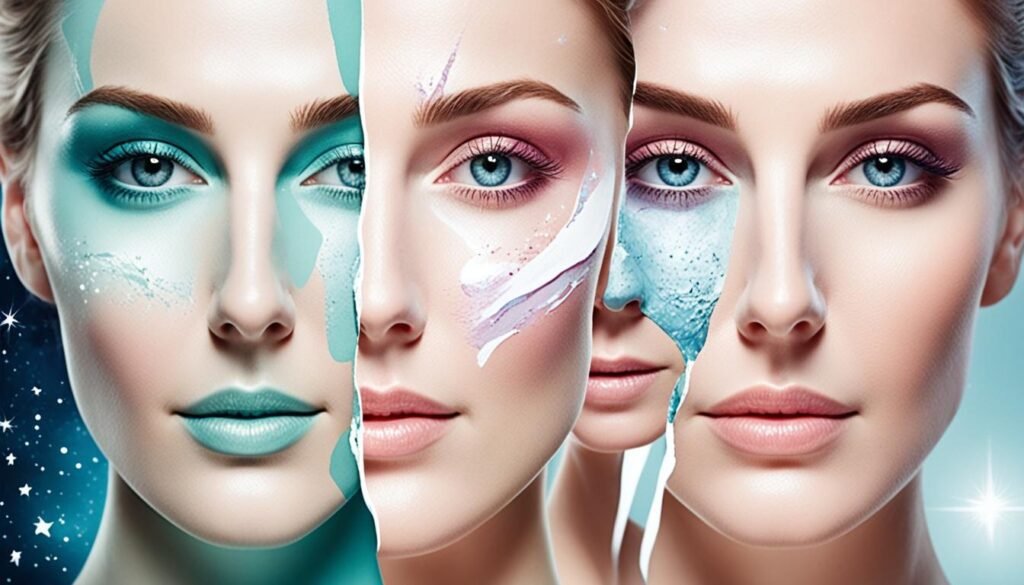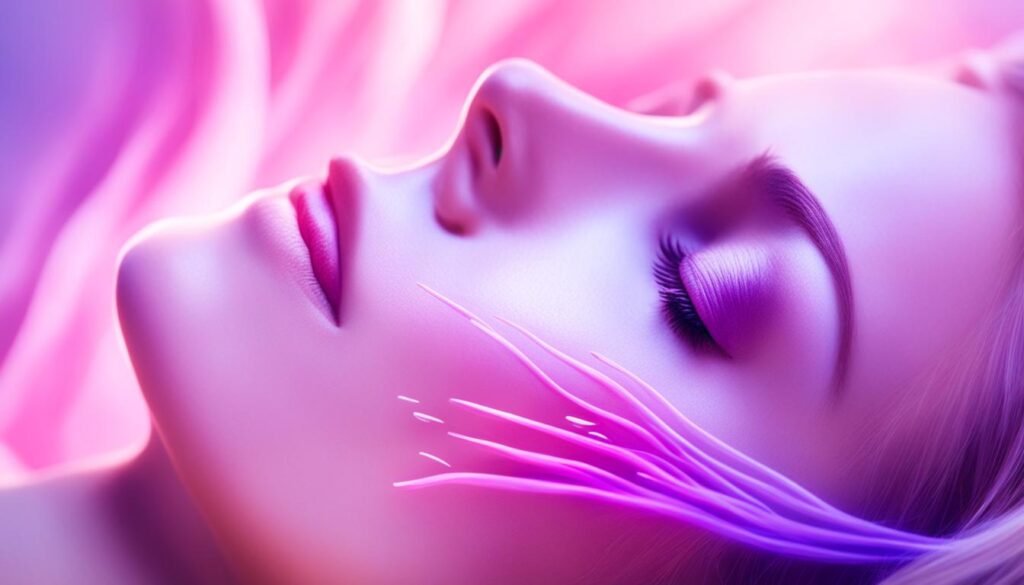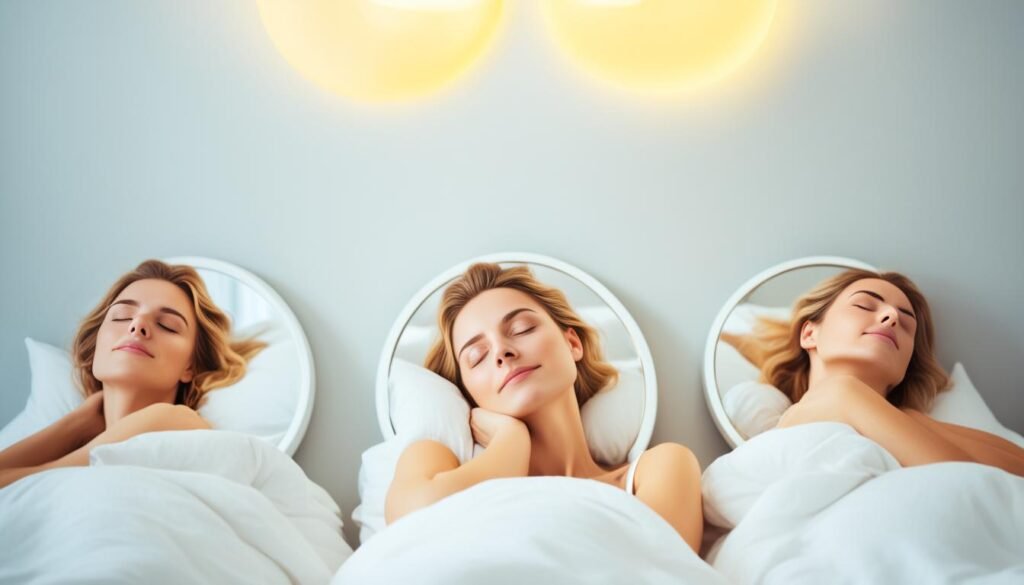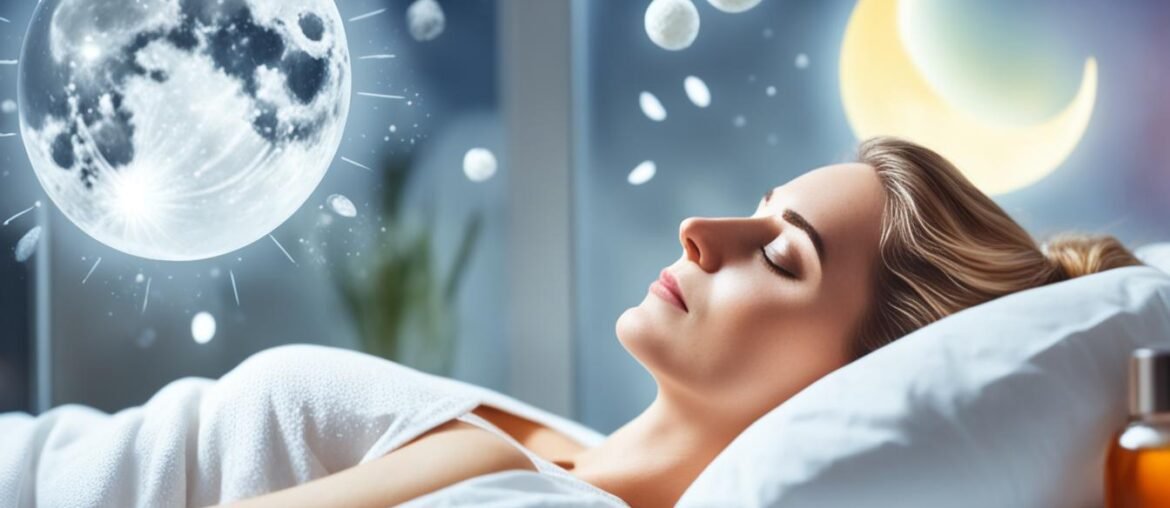According to a recent study, did you know that sleep plays a crucial role in maintaining healthy and younger-looking skin? It’s not just about skincare products and treatments; getting sufficient and quality sleep is essential for achieving that coveted youthful glow. Sleep directly impacts the health and appearance of our skin, influencing factors such as wrinkles, complexion, and overall skin vitality.
During sleep, our body undergoes various regenerative processes that are crucial for skin health. From increased production of growth hormones to the repair of damaged cells, sleep is a time when our body works tirelessly to rejuvenate and revitalize. On the other hand, sleep deprivation can lead to visible signs of aging, including fine lines, dark circles, and a dull complexion.
In this article, we will explore the fascinating connection between sleep and skin health. We’ll delve into the science behind “beauty sleep,” understand how sleep deprivation impacts our appearance, and uncover the potential benefits of prioritizing quality sleep. Additionally, we’ll share some practical tips for getting more beauty sleep and maintaining a healthy sleep routine.
So, if you’re looking for a natural and effective way to improve your skin’s appearance, it’s time to pay attention to your sleep habits. Discover how sleep can work wonders for your skin and unlock the secrets of maintaining a radiant, youthful glow.
Key Takeaways:
- Sleep plays a crucial role in maintaining healthy and younger-looking skin.
- During sleep, the body undergoes regenerative processes that contribute to skin health and appearance.
- Sleep deprivation can lead to visible signs of aging, including wrinkles and a dull complexion.
- Prioritizing quality sleep can have multiple benefits for the skin, such as reducing wrinkles and maintaining a clear complexion.
- By implementing good sleep habits, individuals can enhance their skin’s health and achieve a youthful glow.
The Science Behind “Beauty Sleep”
While the concept of “beauty sleep” is widely known, there is limited scientific evidence directly linking quality sleep to physical beauty. However, sleep plays a crucial role in maintaining and repairing the body, which can influence physical appearance in various ways. Allow me to delve into the science behind “beauty sleep” and its impact on our physical appearance.
During sleep, our bodies engage in processes that contribute to muscle growth, cell rebuilding, prevention of sickness, and memory function. These activities are essential for maintaining overall health, including the health and appearance of our skin, hair, and other features. While beauty standards may vary across cultures, getting sufficient sleep can have positive effects on a person’s physical appearance and contribute to their self-perception of beauty.
Research has shown that sleep deprivation can lead to various negative physical changes, such as paler skin, wrinkles, drooping eyelids, and dark circles under the eyes. On the other hand, prioritizing quality sleep can have a rejuvenating effect on our physical appearance. Adequate sleep supports collagen production, helps repair damaged skin cells, and promotes a clear and vibrant complexion.
Sleep is not only essential for our overall well-being but also plays a significant role in our physical appearance. Quality sleep promotes muscle growth, cell regeneration, and a healthy immune system – factors that are closely tied to our physical beauty.
While the direct link between sleep and physical beauty is still being explored scientifically, there is no denying the impact of a good night’s rest on our physical appearance. From a refreshed and youthful complexion to radiating confidence, getting sufficient sleep can truly enhance our overall physical appeal.
How Sleep Deprivation Impacts Appearance
Sleep deprivation can have a significant impact on a person’s physical appearance. When adults consistently get less than the recommended seven to nine hours of sleep, it can lead to various noticeable changes in their looks. These effects of sleep deprivation on appearance are not just superficial; they can also have social implications, affecting how others perceive them regarding character, aggression, and trustworthiness.
One of the most immediate and apparent effects of sleep deprivation is paler skin. Sleep-deprived individuals often have a dull and lackluster complexion, as their skin tends to lose its natural glow and radiance. In addition to looking tired, they may also develop more wrinkles and fine lines, particularly around the eyes and mouth. These signs of aging can make a person appear older than their actual age.
Furthermore, sleep deprivation can cause the corners of the mouth to hang, giving a person a more sad or frowning expression. Drooping or hanging eyelids are another common effect, making the eyes appear heavy and tired. Sleep-deprived individuals often experience red or swollen eyes, giving them a bloodshot appearance. Dark circles below the eyes are also a telltale sign of sleep deprivation, as the skin in that area appears darker due to poor circulation and fluid retention.
It’s worth noting that these physical changes resulting from sleep deprivation can go beyond mere aesthetics. When someone looks tired and fatigued due to lack of sleep, it can impact how others perceive their energy levels and emotional state. Sleep-deprived individuals may be mistaken as being less alert, less engaged, or even less motivated, which can have implications in various social and professional contexts.
“Sleep deprivation not only affects your appearance but also how others perceive you. Looking rested and refreshed can significantly influence how you are perceived in social and professional interactions.” – Dr. Elizabeth Smith, Dermatologist
Overall, sleep deprivation can have a significant impact on a person’s appearance and how they are perceived by others. By prioritizing sleep and ensuring adequate rest, individuals can improve their skin’s health and rejuvenate their appearance, presenting a more vibrant, youthful, and well-rested image.
| Effects of Sleep Deprivation on Appearance | Description |
|---|---|
| Paler Skin | A lack of sleep can result in a dull and lackluster complexion. |
| Wrinkles and Fine Lines | Sleep deprivation can accelerate the development of fine lines and wrinkles, making a person appear older. |
| Hanging Corners of the Mouth | Sleep-deprived individuals may have a perpetually sad or frowning expression due to drooping mouth corners. |
| Drooping or Hanging Eyelids | Lack of sleep can cause the eyelids to droop, giving a heavy and tired look. |
| Red or Swollen Eyes | Sleep deprivation often leads to bloodshot eyes, appearing red or swollen. |
| Dark Circles Below the Eyes | Fluid retention and poor circulation can result in noticeable dark circles beneath the eyes. |
Potential Benefits of Beauty Sleep

Quality sleep, often referred to as “beauty sleep,” can have numerous benefits for the skin. Sufficient and restful sleep plays a crucial role in maintaining healthy and youthful-looking skin. Here are some of the potential benefits of beauty sleep:
Reduction of Wrinkles
Sleeping well can help reduce the appearance of wrinkles. During sleep, the body produces collagen, a protein that helps to maintain the strength and elasticity of the skin. Adequate sleep supports collagen production, helping to diminish the appearance of fine lines and wrinkles.
Clear Skin Complexion
A proper sleep routine contributes to a clear and radiant complexion. While we sleep, our body’s internal clock, known as the circadian rhythm, regulates the repair and renewal of skin cells. Sufficient sleep provides the necessary time for damaged cells to be repaired, leading to a healthier and more even skin tone.
Reduction of Dark Circles
While the reduction of dark circles under the eyes is not solely attributed to sleep, quality sleep can improve overall skin appearance, including the reduction of puffiness and inflammation. When we are well-rested, the skin around the eyes appears refreshed, resulting in a decreased appearance of dark circles.
Impact on Hair Health
Beauty sleep not only benefits the skin but also impacts the health of our hair. Lack of sleep can lead to increased stress levels, which can contribute to hair loss and thinning. By prioritizing quality sleep, we can reduce stress and promote proper hair growth, resulting in healthier and lustrous locks.
Sleep plays a vital role in maintaining healthy skin and hair. It is important to prioritize quality sleep and establish a consistent sleep routine to reap the benefits of beauty sleep.
Tips for Getting More Beauty Sleep
To optimize sleep quality and reap the benefits of “beauty sleep,” it is important to practice good sleep hygiene. Here are some tips to help you improve the quantity and quality of your sleep, leading to healthier and younger-looking skin:
- Establish a Regular Sleep Schedule: Go to bed and wake up at the same time every day, even on weekends. This helps regulate your body’s internal clock and promote better sleep quality.
- Create a Quality Sleep Environment: Make sure your sleep environment is dark, quiet, and comfortable. Use blackout curtains or an eye mask to block out light, earplugs or white noise machine to minimize noise, and a supportive pillow and mattress for optimal comfort.
- Engage in Regular Exercise: Incorporate regular exercise into your daily routine, preferably a few hours before bedtime. Physical activity can help promote better sleep and overall well-being.
- Wind Down with a Calming Evening Routine: Establish a relaxing evening routine to signal to your body that it’s time to unwind and prepare for sleep. This can include activities such as reading, taking a warm bath, practicing meditation or deep breathing exercises, or listening to soothing music.
- Avoid Electronic Devices Before Bed: The blue light emitted by electronic devices like smartphones, tablets, and computers can interfere with your body’s natural sleep-wake cycle. Try to avoid using these devices at least an hour before bedtime.
- Avoid Lying Awake in Bed: If you find yourself unable to fall asleep after about 20 minutes, get out of bed and engage in a relaxing activity until you feel sleepy again. This helps prevent associating your bed with restlessness and frustration.
By incorporating these tips into your lifestyle, you can improve your sleep quality and create a bedtime routine that promotes healthier and younger-looking skin.
The Relationship Between Sleep and Skin Repair

While asleep, the body undergoes various repairing processes, including the repair of skin cells. During sleep, there is increased blood flow to the skin, which promotes collagen production and aids in the repair of damage caused by UV exposure. This increased blood flow and collagen production contribute to maintaining the health and appearance of the skin, reducing wrinkles and age spots. Getting sufficient sleep is essential for allowing these repairing processes to occur and ensuring optimal skin health.
When we sleep, our body goes into repair mode, and our skin is no exception. The increased blood flow to the skin during sleep helps deliver essential nutrients and oxygen to the cells, promoting their repair and regeneration. This process is crucial for maintaining the overall health and appearance of our skin.
Collagen, a protein responsible for the skin’s firmness and elasticity, is also produced during sleep. The increased collagen production helps to strengthen and repair damaged skin cells, reducing the appearance of wrinkles and promoting a more youthful complexion.
The repair mechanisms that occur during sleep are essential for reversing the damage caused by UV exposure. UV rays from the sun can cause DNA damage and oxidative stress in the skin cells. While we sleep, our body can effectively repair this damage, preventing long-term effects such as premature aging and skin cancer.
By prioritizing sleep and ensuring we get enough restful hours each night, we can support the natural repair processes of our skin and maintain its health and vitality. It is recommended to establish a consistent sleep routine and create a sleep-friendly environment to optimize the benefits of sleep for skin repair.
| Benefits of Sleep for Skin Repair | How Sleep Affects Skin |
|---|---|
| Promotes collagen production | Reduces wrinkles and age spots |
| Increases blood flow to the skin | Aids in repair from UV damage |
| Enhances skin cell regeneration | Improves overall skin health and appearance |
The Importance of Maintaining a Skin Barrier
Adequate sleep plays a crucial role in maintaining the skin barrier function, which is essential for overall skin health. The skin barrier acts as a protective shield, preventing transepidermal water loss (TEWL) and guarding against environmental stressors. When we have poor sleep quality, it can impair the integrity of the skin barrier, leading to increased TEWL and decreased skin hydration.
This compromised skin barrier function can have significant consequences on the skin’s health and appearance. The increased transepidermal water loss can result in dryness, irritation, and heightened sensitivity to external factors. Without a well-functioning skin barrier, the skin becomes more susceptible to environmental stressors such as pollutants, UV radiation, and harsh weather conditions.
These environmental stressors can further escalate skin issues and accelerate the aging process. The skin may experience heightened inflammation, oxidative damage, and a weakened ability to repair itself. Consequently, individuals may suffer from a variety of skin problems, including rashes, acne, and premature aging.
To maintain a healthy skin barrier, it is crucial to prioritize proper sleep hygiene and hydration. Consistently getting enough sleep allows the body to regenerate and replenish the skin, supporting its barrier function. Adequate hydration also plays a vital role in maintaining healthy skin by promoting moisture retention and enhancing the skin’s resilience against external stressors.
Tips for Maintaining a Healthy Skin Barrier
| Tip | Description |
|---|---|
| Establish a Consistent Sleep Schedule | Go to bed and wake up at the same time every day to regulate your body’s internal clock and support the skin’s natural repair processes. |
| Stay Hydrated | Drink an adequate amount of water throughout the day to maintain optimal skin hydration and support the skin barrier function. |
| Protect Your Skin from Environmental Stressors | Wear sunscreen, protective clothing, and seek shade when exposed to UV radiation. Use barrier creams or moisturizers to shield the skin from pollution and harsh weather conditions. |
| Avoid Harsh Skin Products | Choose gentle cleansers and skincare products that are suitable for your skin type. Harsh ingredients can disrupt the skin barrier function and cause irritation. |
| Maintain a Healthy Diet | Eat a balanced diet rich in antioxidants, vitamins, and minerals to support overall skin health and strengthen the skin barrier. |
By prioritizing quality sleep and adopting good skincare practices, individuals can protect and maintain their skin barrier, ultimately promoting healthier, more resilient, and younger-looking skin.
Sleep and Self-Perception of Appearance

Research has shown that individuals who prioritize good quality sleep tend to have a better self-perception of their attractiveness and satisfaction with their appearance. When we get sufficient and quality sleep, our bodies and minds undergo a rejuvenating process, resulting in a refreshed and revitalized look, which can greatly impact how we perceive ourselves.
Achieving a good night’s sleep contributes to a more youthful and glowing appearance, enhancing our overall satisfaction with our appearance. When we prioritize sleep and practice good sleep habits, such as maintaining a consistent sleep schedule and creating a conducive sleep environment, we set ourselves up for better self-perception and increased self-confidence.
Not only does quality sleep contribute to physical revitalization, but it also has a significant impact on our mental and emotional well-being. Feeling well-rested and looking our best can boost our self-confidence in various social and professional situations. A confident self-perception can radiate outwardly, positively influencing how others perceive us and our interactions with them.
It is important to note that self-perception of attractiveness is subjective and can vary from person to person. However, by prioritizing sleep and embracing good sleep hygiene practices, we can enhance our self-perceived attractiveness and overall well-being.
Conclusion
Sleep is not only essential for overall well-being, but it also plays a crucial role in maintaining healthy and youthful-looking skin. By allowing the body to repair and renew itself, quality sleep promotes skin health and prevents undesirable changes in physical appearance. In contrast, sleep deprivation can lead to paler skin, wrinkles, dark circles, and other skin issues.
Fortunately, there are multiple benefits of getting sufficient and quality sleep. It can help reduce wrinkles, maintain a clear complexion, and improve overall skin health. Achieving the coveted “beauty sleep” effect is possible by prioritizing sleep hygiene and developing good sleep habits.
By establishing a regular sleep schedule, creating a peaceful sleep environment, exercising regularly, and following a calming evening routine, individuals can enhance their skin’s health and appearance. It is important to avoid electronic devices before bed and resist lying awake in bed if unable to sleep. By incorporating these practices, individuals can experience the transformative power of quality sleep, achieving the beauty sleep they desire.
FAQ
How does sleep affect skin health?
Sleep plays a crucial role in maintaining and repairing the entire body, including the skin. During sleep, the body experiences increased production of growth hormone, creation of hormones that prevent sickness and fight infection, and formation and maintenance of pathways in the brain related to learning and memory. Sleep deprivation can negatively affect the skin, causing changes such as paler skin, wrinkles, and dark circles under the eyes.
What are the negative effects of sleep deprivation on appearance?
Sleep deprivation can have negative effects on a person’s physical appearance, making them appear sadder and more fatigued. Common signs of sleep deprivation on the skin include paler skin, wrinkles and fine lines, hanging corners of the mouth, drooping or hanging eyelids, red or swollen eyes, and dark circles below the eyes.
What are the potential benefits of “beauty sleep” for the skin?
“Beauty sleep” can have several benefits for the skin. Quality sleep supports collagen production, reduces wrinkles, maintains a clear complexion, and improves overall skin health. While it is not definitively linked to reduced dark circles under the eyes, getting good quality sleep can improve skin appearance by reducing puffiness and inflammation.
How can I get more beauty sleep?
To optimize sleep quality and reap the benefits of “beauty sleep,” it is important to practice good sleep hygiene. This includes establishing a regular sleep schedule, creating a quality sleep environment that is dark and quiet, exercising regularly (preferably a few hours before bedtime), winding down with a calming nighttime routine, avoiding the use of electronic devices before bed, and avoiding lying awake in bed if unable to fall asleep.
How does sleep impact skin repair?
When asleep, the body undergoes various repairing processes, including the repair of skin cells. During sleep, there is increased blood flow to the skin, which promotes collagen production and aids in the repair of damage caused by UV exposure. This increased blood flow and collagen production contribute to maintaining the health and appearance of the skin, reducing wrinkles and age spots.
Why is maintaining a skin barrier important?
Adequate sleep plays a role in maintaining the skin barrier, which is crucial for skin health. Poor sleep quality can lead to an impaired skin barrier function, resulting in increased transepidermal water loss (TEWL) and decreased skin hydration. This can make the skin more susceptible to environmental stressors, leading to various skin issues such as dryness, irritation, rashes, and acne.
How does sleep impact self-perception of appearance?
Research has shown that individuals who get good quality sleep tend to have a better self-perception of their appearance and attractiveness. Quality sleep contributes to a refreshed and rejuvenated look, which can increase overall satisfaction with one’s appearance. This improved self-perception of attractiveness can positively impact self-confidence and overall well-being.
What is the conclusion about sleep and skin health?
Sleep plays a vital role in maintaining healthy and younger-looking skin. Quality sleep allows the body to repair and renew various physiological systems, including the skin. Sleep deprivation can negatively impact physical appearance, leading to paler skin, wrinkles, and other undesirable changes. On the other hand, getting sufficient and quality sleep can have multiple benefits for the skin, such as reducing wrinkles, maintaining a clear complexion, and improving overall skin health.




